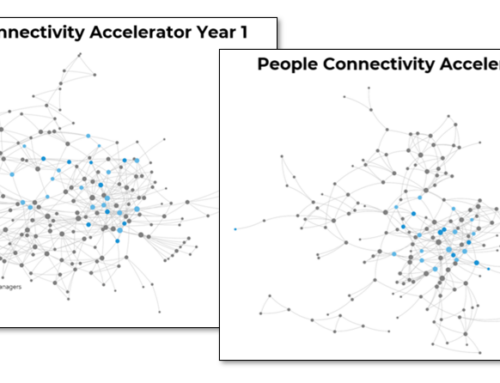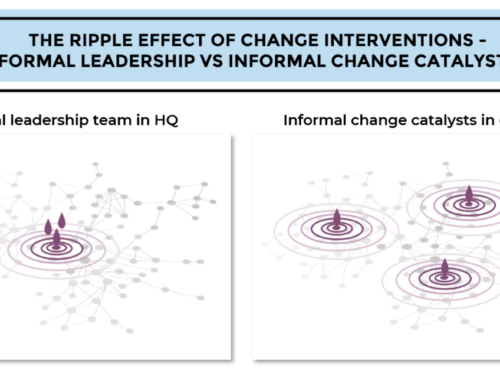BUILD CULTURE
The Death of Traditional Office Culture?
October 25th, 2023 | Build culture

Organizational culture dynamics are in the middle of a profound transformation, giving rise to a heated debate: are we witnessing the ‘death’ of the traditional office culture, or is it merely evolving in response to the changing times? Both personally, and professionally with my work at Innovisor, I am interested in the debate and discourse surrounding remote-vs-hybrid-vs-return-to-office: What is the impact on the ‘new workforce’? How important is our digital presence? How can we see the loneliness epidemic at play at work? What about the case for ‘forced office fun.’ And most importantly, what is the shared responsibility of shaping culture in this ever-evolving landscape?
The war between in-person & remote work
Strong opinions on this topic are abundant, as evident anytime we open LinkedIn, but it’s important to remember that the loudest voices don’t necessarily represent the majority. Is there truly a ‘death of office friendships,‘ as suggested by Boston Mag? Perhaps, the traditional office culture is not ‘dead’ but instead transforming into a more hybrid and adaptable form. While remote work and digital communication have gained prominence, many still value the sense of community and in-person interactions that the physical office provides. At Innovisor, our network data highlights the growing number of individuals excluded from informal networks, leading to increasingly transactional work relationships.
But why does that matter? The value of strong relationships
Strong relationships and friendships are good for business, leading to better performance, retention, and engagement (Gallup 2018, Gallup 2022). More importantly, work friendships and social connections contribute to greater life satisfaction (Gallup).
The responsibility of shaping organizational culture doesn’t rest solely with leadership. It’s a shared endeavor in which each member of the organization plays a part. Leaders set the tone and should role-model behaviors, but everyone contributes to the collective culture through their behaviors, attitudes, and interactions. Open communication, mutual respect, and shared values are essential in this collaborative effort.
Intentionality in action
In his book, Another Change Fiasco, my boss Jeppe Vilstrup Hansgaard emphasized, “how we show up – or not show up – at work matters far more than we realize.” This perspective is especially relevant in an era where remote work offers valuable flexibility to employees but has also contributed to the loneliness epidemic. The lack of daily face-to-face interactions has left many employees feeling isolated. In my view, evolving work environments play a central role in this loneliness epidemic, demanding organizations to find ways to foster connections and support remote employees. In response to the loneliness epidemic and the shifting dynamics of office culture, some argue for ‘mandatory office fun‘. These structured activities, whether in-person or virtual, may seem contrived at first, but they serve a crucial role in promoting team bonding and maintaining a sense of belonging. In an era where physical proximity is no longer a guarantee, ‘forced office fun’ provides a way to build and maintain connections. On an individual level, it means ‘showing up’, as Jeppe put it. The small morning greetings, coffee breaks (whether virtual or not) with colleagues, and having fun at work can’t just be a ‘nice-to-have’.
The future of work
I hope that the ‘death’ of traditional office culture is not a demise, but rather a metamorphosis. The new work environment presents both opportunities and challenges, requiring a balance between flexibility and the prioritization of connections. This won’t happen on its own. It requires intentionality. Whether through ‘forced office fun’, prioritization of connections, and role modeling leaders, the evolving culture of the workplace will continue to shape our experiences and influence how we work together in this ever-changing landscape. It is our shared responsibility to ensure that the ‘death’ of traditional office culture transforms into a vibrant, adaptable, and interconnected work environment where every person finds a sense of belonging and purpose.
BUILD CULTURE
The Death of Traditional Office Culture?
October 25th, 2023 | Build culture
Organizational culture dynamics are in the middle of a profound transformation, giving rise to a heated debate: are we witnessing the ‘death’ of the traditional office culture, or is it merely evolving in response to the changing times? Both personally, and professionally with my work at Innovisor, I am interested in the debate and discourse surrounding remote-vs-hybrid-vs-return-to-office: What is the impact on the ‘new workforce’? How important is our digital presence? How can we see the loneliness epidemic at play at work? What about the case for ‘forced office fun.’ And most importantly, what is the shared responsibility of shaping culture in this ever-evolving landscape?

The war between in-person & remote work
Strong opinions on this topic are abundant, as evident anytime we open LinkedIn, but it’s important to remember that the loudest voices don’t necessarily represent the majority. Is there truly a ‘death of office friendships,‘ as suggested by Boston Mag? Perhaps, the traditional office culture is not ‘dead’ but instead transforming into a more hybrid and adaptable form. While remote work and digital communication have gained prominence, many still value the sense of community and in-person interactions that the physical office provides. At Innovisor, our network data highlights the growing number of individuals excluded from informal networks, leading to increasingly transactional work relationships.
But why does that matter? The value of strong relationships
Strong relationships and friendships are good for business, leading to better performance, retention, and engagement (Gallup 2018, Gallup 2022). More importantly, work friendships and social connections contribute to greater life satisfaction (Gallup).
The responsibility of shaping organizational culture doesn’t rest solely with leadership. It’s a shared endeavor in which each member of the organization plays a part. Leaders set the tone and should role-model behaviors, but everyone contributes to the collective culture through their behaviors, attitudes, and interactions. Open communication, mutual respect, and shared values are essential in this collaborative effort.
Intentionality in action
In his book, Another Change Fiasco, my boss Jeppe Vilstrup Hansgaard emphasized, “how we show up – or not show up – at work matters far more than we realize.” This perspective is especially relevant in an era where remote work offers valuable flexibility to employees but has also contributed to the loneliness epidemic. The lack of daily face-to-face interactions has left many employees feeling isolated. In my view, evolving work environments play a central role in this loneliness epidemic, demanding organizations to find ways to foster connections and support remote employees. In response to the loneliness epidemic and the shifting dynamics of office culture, some argue for ‘mandatory office fun‘. These structured activities, whether in-person or virtual, may seem contrived at first, but they serve a crucial role in promoting team bonding and maintaining a sense of belonging. In an era where physical proximity is no longer a guarantee, ‘forced office fun’ provides a way to build and maintain connections. On an individual level, it means ‘showing up’, as Jeppe put it. The small morning greetings, coffee breaks (whether virtual or not) with colleagues, and having fun at work can’t just be a ‘nice-to-have’.
The future of work
I hope that the ‘death’ of traditional office culture is not a demise, but rather a metamorphosis. The new work environment presents both opportunities and challenges, requiring a balance between flexibility and the prioritization of connections. This won’t happen on its own. It requires intentionality. Whether through ‘forced office fun’, prioritization of connections, and role modeling leaders, the evolving culture of the workplace will continue to shape our experiences and influence how we work together in this ever-changing landscape. It is our shared responsibility to ensure that the ‘death’ of traditional office culture transforms into a vibrant, adaptable, and interconnected work environment where every person finds a sense of belonging and purpose.
Related articles
Share article
Share article
Conversations with business practitioners who got it done!
Access proven strategies from industry leaders across various sectors and company sizes.
Fix Your Culture! This is How, written by Innovisor’s CEO Jeppe Hansgaard and Culture Expert Hilton Barbour, delivers exclusive interviews with global professionals who have successfully implemented culture change using Change Analytics and Organizational Network Analysis.










